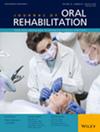Complex Associations Between Pain and Masticatory Function in Patients With Muscular Temporomandibular Disorders
Abstract
Background
Previous studies have focused on alleviating pain in patients with temporomandibular disorders (TMDs). However, deficits in masticatory function, including subjective eating experience and masticatory performance, and the associations between pain and mastication have not been fully elucidated.
Objective
The current study aimed to investigate clinical pain, masticatory function, and their associations in patients with muscular TMD before and after treatment.
Methods
Twenty-seven patients with muscular TMD and 27 healthy participants (non-TMD group) were included. The groups were matched based on age, sex, and number of missing teeth. The TMD group completed assessments at two timepoints: the first time when they underwent TMD examinations, and 3 months later. All the participants underwent assessments of masticatory function, including subjective experiences of eating difficulty in daily meals and the use of adaptive eating strategies, as well as an objective assessment of masticatory performance. Additionally, current pain and muscle pain were assessed among TMD patients before and after treatment.
Results
(a) Before treatment, patients with muscular TMD had greater eating difficulty and used more adaptive eating strategies than non-TMD individuals but exhibited similar masticatory performance. (b) Patients with muscular TMD had improved masticatory performance, reduced current pain, and reduced muscle pain after treatment. (c) Before treatment, more severe pain was associated with worse masticatory performance among TMD patients. The association between muscle pain and masticatory performance was nonsignificant.
Conclusion
Patients with muscular TMD had worse masticatory experience than individuals without TMD but maintained adequate masticatory performance. Treatment was associated with improved masticatory performance, and more severe pain before treatment was associated with worse masticatory performance.


 求助内容:
求助内容: 应助结果提醒方式:
应助结果提醒方式:


